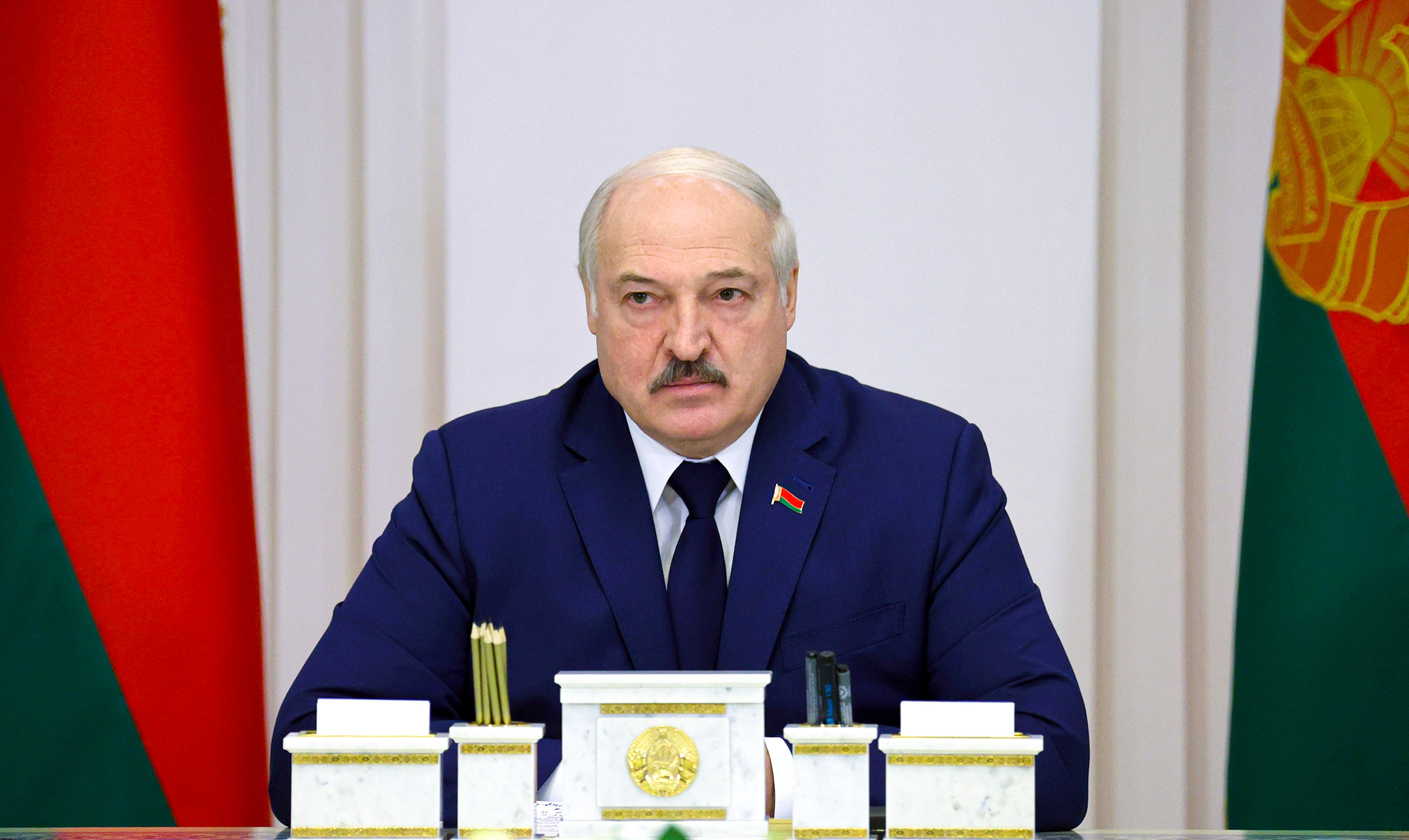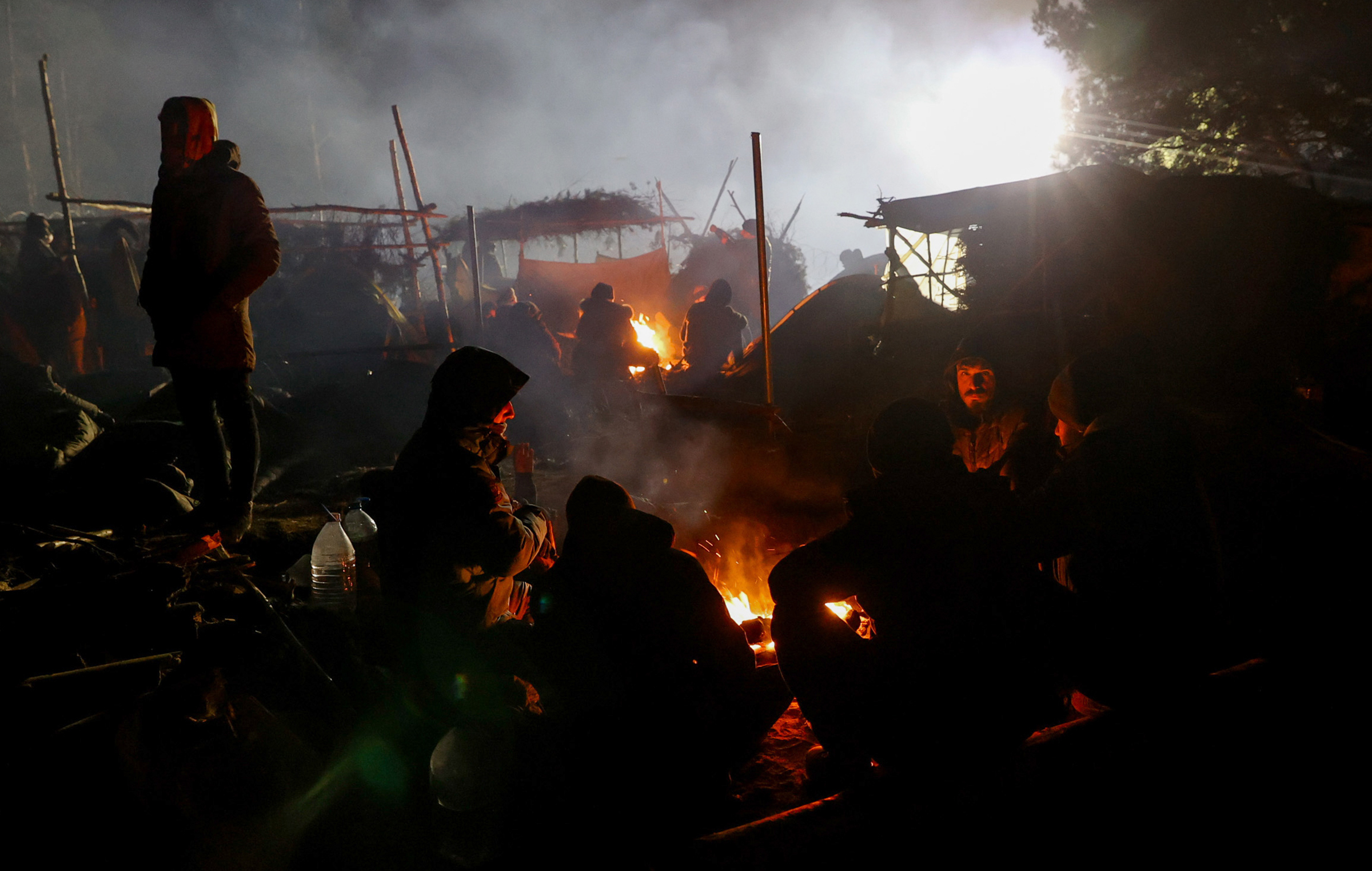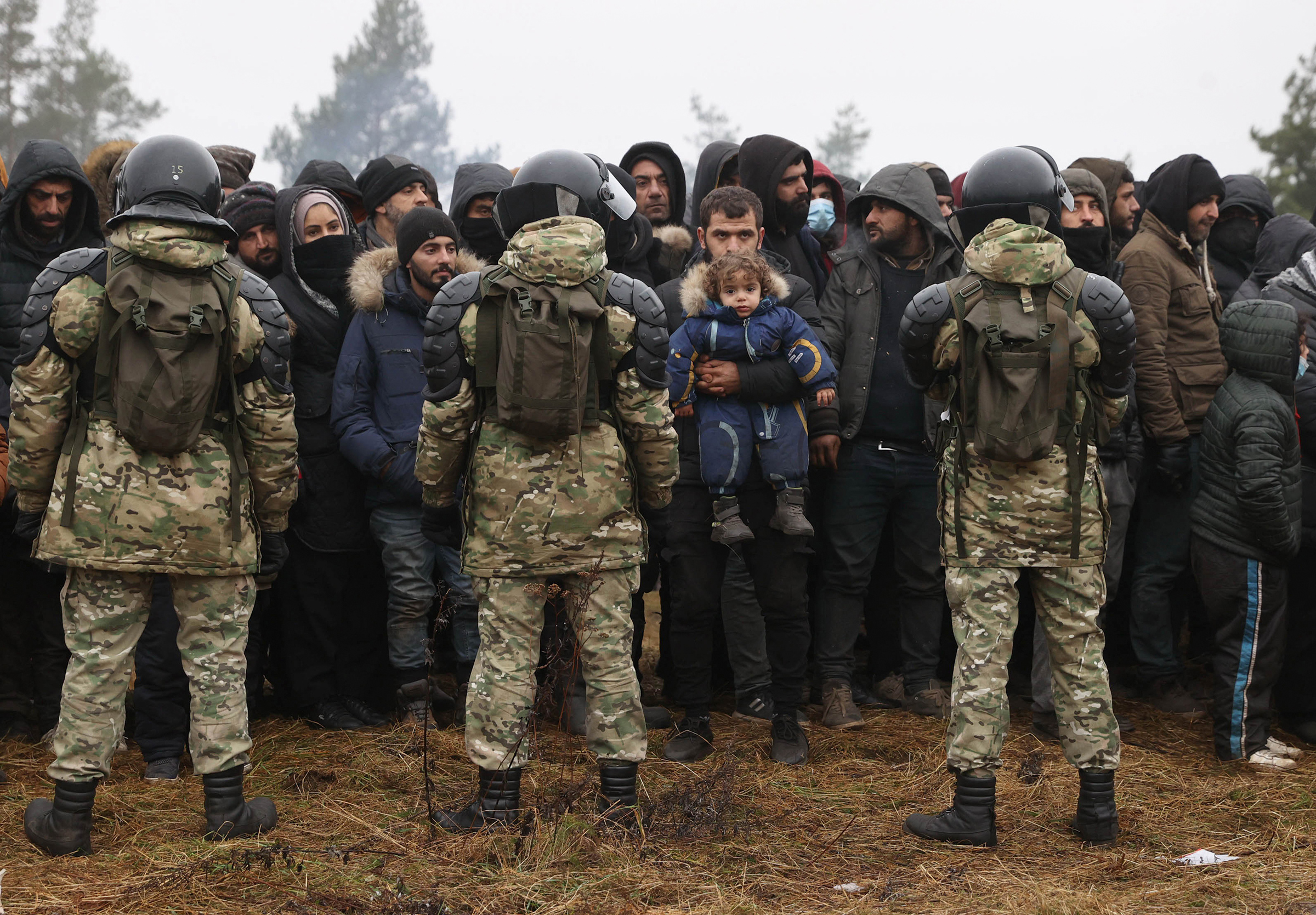Perhaps the greatest success the sclerotic dictatorship of Alexander Lukashenko has racked up this week has been seeing a host of Western news reports refer to grim scenes at the Belarusian-Polish border as a “migration crisis,” the implication being that it’s happened organically, as it did seven years ago—the tragic byproduct of war, poverty and terrorism. A more accurate description would be that an authoritarian regime and its aptly named KGB security service manufactured this crisis, exploiting human suffering and the simple desire for a better life as a cynical instrument of foreign policy.
An estimated 3,000 to 4,000 people, mostly from the Middle East, are now huddled in freezing campsite tents awaiting permission to enter the European Union because Lukashenko decided to turn men, women and children into battering rams as retaliation for E.U. sanctions and diplomatic isolation owing to his theft of last year’s presidential election; his ongoing imprisonment and torture of political opponents; and his hijacking of a European airliner earlier this year to arrest a dissident journalist who was on board. It is the yield, in other words, of an increasingly erratic and desperate strongman who takes hostages and then chooses to negotiate with those seeking their release by taking more of them.
Lukashenko is not exactly shy about his strategy. He boasts about it in advance. In June, his regime faked a bomb scare aboard the Vilnius-bound RyanAir Flight 4978, dangerously forcing it (with the “escort” of fighter jets) to divert to Minsk in order to kidnap Roman Protasevich, a pro-opposition journalist on board. Days after he declared what would happen if the West chose to do anything about his brazen act of piracy, which it did first of all by banning European travel via Belarusian air space. He would release human traffickers and drug smugglers into the E.U., he said, later adding that these would also be joined by “armed migrants,” a double entendre because his aim was always to use them as weapons.
Good to his word, soon more than 470 sub-Saharan Africans, Syrians, and Iraqis, mainly hailing from the Kurdistan region, turned up at the Belarusian-Lithuanian border. Lukashenko then declared he could do nothing about this nearly sevenfold increase in Lithuania’s annual asylum-seekers because, alas, he had “neither the money nor the energy due to sanctions.” A movie mobster played by Joe Pesci might have found that shakedown a touch unartful.

Belarusian authorities were actively helping migrants cross the border, for example by bringing them to less patrolled areas where they could cross undetected, and even providing them with wire cutters.
An official in Iraq’s Kurdistan Regional Government explained to us how this bespoke Belarusian Expedia program works. “There are travel agents all over the Middle East, a select number of whom ring up families who aren’t exactly poor, but nor are they what you’d call well-off. The travel agents tell these people: ‘I’m going to get you into the EU in a few days. I’ll get you your visa, book your hotel, your flight—all you have to do is fly to Baghdad and I’ll take it from there.’ It costs maybe $3,000 per person. And guess what? If they can beg, borrow or steal the cost of doing so, they’re getting on that plane.” The Belarusian Embassy in Baghdad, the official added, has been running a no-questions-asked “visa-mill” for months to facilitate the entire scheme.
Contrast that to the refugee and migrant waves of 2015, when thousands drowned trying desperately to smuggle themselves into Europe via the Mediterranean aboard boats and rafts. The majority of the Iraqis coming to Belarus, the Kurdish official clarified, are not internally displaced from other parts of Iraq owing to the still-roiling military campaign against ISIS. Rather, most come from Kurdistan, a comparatively stable enclave in the Middle East albeit mired in corruption and clan-based oligarchy and precariously reliant on oil prices for economic well-being. Even so, many of its inhabitants would have stayed put were it not for a once-in-a-lifetime (and too good to be true) offer of relocating to the continent.
Iraqi travel agencies have lately been advertising heavily on social media. Research conducted by one of us with Semantic Visions, a Prague-based risk assessment company, found that Arabic-language groups primarily on Facebook featured discussions of entering the EU via the Belarusian-Lithuanian border as early as March 2021. The route was sold as especially promising because it was (falsely) stated that the Belarusians don’t guard their border. Not coincidentally, at around the same time, the number of direct flights from Baghdad to Minsk, many offered by Belavia, Belarus’ state-run airline, began to increase.
Nor was it a coincidence that Lithuania was Lukashenko’s first target. The neighboring Baltic state has been outspoken in its solidarity with Belarus’s swelling ranks of dissidents and civil society actors and has become a much-needed triage center and waystation for many in the midst of Lukashenko’s year-long internal crackdown. Vilnius is now the residence in exile of what its government together with the EU calls the rightful winner of the 2020 presidential election, Sviatlana Tsikhanouskaya, whose husband Sergei Tikhanovsky had originally tried to run for the office but was arrested before the vote.
In the face of the sudden onrush of visitors, Lithuanians were rapidly forced to set up detention centers and make clear that asylum would not be granted except in extreme circumstances. The government also stipulated that transit to Germany—the preferred final destination of many of the migrants—would not be facilitated. As Lithuania intercepted more migrants, the Belarusian Border Guard started blocking them from reentering Belarusian territory, trapping them in a no-man’s-land between two countries bisected by razor wire fence.
Poland was Lukashenko’s second target. Warsaw, too, has been a prominent defender of Belarusian democrats (even if Poland’s own democracy has seen better days). In mid-July, President Andrzej Duda sent a convoy of humanitarian aid to Lithuania, whose authorities were struggling to manage the unprecedented migrant influx. Then, in August, he offered asylum to Krystsina Tsimanouskaya, the Belarusian Olympic sprinter who defected during the Tokyo games after criticizing her coaches, creating more PR headaches for a dictator who already had a surfeit of them. As of November 11, there were more than 32,000 blocked migrant attempts to cross the Belarusian-Polish border: 3,500 were made in August, almost 7,700 in September, and some 17,300 in October.

A series of EU diplomatic interventions with Middle Eastern governments to turn off the spigot of unwelcome arrivals led to a noticeable reduction of direct flights to Minsk. But then would-be migrants began searching for ways to circumvent the new restrictions. Smugglers, many of them based in Germany, filled the void, promising access to their country via Poland. Research conducted by Semantic Visions found that these human traffickers hawked their services and low prices on social media, along with thank-you videos from those they claimed they’d successfully delivered to Germany. In late October, Berlin increased patrols along the border with Poland, having already stopped around 5,000 migrants who’d turned up via Belarus since August.
According to Linas Linkevicius, the former Lithuanian foreign minister who oversaw Belarus’ post-election fallout, six months ago Lukashenko at least had the politesse to attempt his migration gambit under the cover of darkness. “Now he’s doing it in broad daylight, and along a much longer border, and he’s filming it for the world to see,” Linkevicius said. “It also doesn’t bode well that he insists he is not mad about three times per week. This is something, in my experience, a sane person seldom has to do.”
Maybe so, but the more belligerent approach toward Poland was almost certainly calculated. Warsaw’s declared state of emergency has been widely criticized both internally and externally, particularly as journalists and aid workers have been prohibited from monitoring the scenes at the border. Several migrants have already died of exposure in the Polish forest. In addition, the country’s ruling nationalist Law and Justice (PiS) party, which has helmed the government since 2015, has weakened Poland’s standing with the European Commission following a series of illiberal encroachments on the impartiality of the Polish judiciary and the independence of the press.
Gen. Pyotr Pytel, the former chief of Polish military counterintelligence, argued that Belarus’s manufactured border crisis has already bled into a domestic Polish political one. “If you listen to what right-wing media are saying, they are using the lexicon of war, portraying these migrants as barbarians looking to destroy Poland. The chief of our central bank just announced the creation of a Polish cryptocurrency to commemorate our fight against the Belarusians, as if this were 1920 all over again,” Pytel said, referring to the thwarted Soviet invasion of a newly independent Poland.
PiS, according to Pytel, is in “big trouble” politically because of mounting inflation, and an unpopular and draconian anti-abortion law it instituted. Elections are two years off, and now an embattled populist party has seized upon a new civilizational narrative in its defense, which Pytel summarized as: “We’re being invaded by Arabs and Kurds from America’s failed wars in the Middle East.” Not exactly rhetoric bound to endear Warsaw further with the European Commission, but then, counting on Polish overreach could well have been one of the goals of this provocation.
Which begs the question: did totally-not-crazy Lukashenko come up with this gambit all on his own, or is he being quietly nudged or assisted by a more resourceful third party?

Pytel suggests that the Kremlin’s role in this affair is hardly that of a passive observer. He points to two fateful meetings earlier in the year, the first a heavily publicized one on May 28 between Russian President Vladimir Putin and Lukashenko in the Russian subtropical city of Sochi. Coming a mere week after the RyanAir skyjacking, that choreographed confab, all smiles and Kate-and-Leo parodied embraces aboard Putin’s yacht, served two purposes. It was an obvious ring-kissing opportunity for Lukashenko to profess his fealty to his indispensable patron to the east; but it was also a way of telegraphing to the U.S. and EU that Putin was the man to see about putting his renegade client back in his box. As one senior Western intelligence official put it, “Moscow wants to force Minsk to burn its last remaining bridges to the West, make itself look good in comparison to crazy Luka, and test EU and NATO resiliency against hybrid threats.”
The second, less-publicized meeting occurred six days later, on June 3, in the Belarusian city of Vitebsk. It was between Sergei Naryshkin, the head of Russia’s foreign intelligence service (SVR), and Ivan Tertel, the head of Belarus’ KGB. “In the spirit of traditionally fraternal relations,” the SVR said in an after-action statement, “Russia’s SVR and Belarus’ KGB have agreed to work together to counter Western destructive activities aimed at destabilizing the political and socioeconomic situation in the Union State.” The latter term refers to a 1999 bilateral integration treaty the Kremlin has lately sought to broaden into something approaching a soft merger between Russia and Belarus, which has so far been loath to chip away its own sovereignty in exchange for protection. But note twinned casualty in this statement: actions taken against Belarus are considered actions taken against Russia.
Pytel thinks the enhanced coordination between intelligence services is already apparent. Weeks after the Naryshkin-Tertel conclave, emails of Poland’s leaders, including those allegedly belonging to Prime Minister Mateusz Morawiecki and Michał Dworczyk, the chief of the Polish chancellery, were leaked on the encrypted Russian messaging platform Telegram. The communication showed these politicians discussing, among other things, deploying the military to disperse abortion law protestors and mocking Poland’s state-owned television. (The government claims at least some of the correspondence was fake.) Using compromised passwords, the cyber-operators also commandeered the social media accounts of three Polish officials and fabricated English-language websites to tendentiously promote the contents of the breach.
Most Popular from TIME
Polish intelligence assessed at the time that the emails were hacked by UNC1151, a group it determined was linked to Russia’s military intelligence agency, or GRU, an analysis confirmed by the EU’s Computer Emergency Response Team. German intelligence also believes the GRU responsible after members of the Bundestag and German state parliaments were hit by the same hack-and-leak group, encompassed under the so-called “Ghostwriter” influence campaign. For the last several years Ghostwriter has targeted countries mostly on Belarus’ periphery, condemning and spreading disinformation about NATO’s presence in Eastern Europe. However, on November 16, Mandiant Threat Intelligence, a U.S. cybersecurity firm, released a report assessing with “high confidence” that UNC1151 is “linked to the Belarusian government,” although it did not rule out possible Russian involvement.
Ben Read, the Director of Cyber-Espionage Analysis at Mandiant, said it’s “definitely plausible” that UNC1151 could be a joint Russian-Belarusian endeavor. “Both security services were part of one country thirty years ago, and I’m sure there are people working for the KGB today who’ve been there over thirty years,” Read told us. As to the discrepant EU assessment, “well, governments have access to classified intelligence, things I can’t see on my computer screen.”
Whatever Russia’s role in fomenting or encouraging this manufactured crisis, the fact remains that it could have ended the problem overnight if it so chose simply by stopping, or threatening to stop, air traffic from the Middle East bound for Belarus —traffic that has had to pass through Russian airspace ever since Europe’s was closed off in June owing to the RyanAir skyjacking. The Kremlin proposed an alternative solution: the E.U. should pay Lukashenko to make the problem go away, as Russian Foreign Minister Sergei Lavrov stated in no uncertain terms on November 9, citing a 2016 deal under which the EU compensated Turkey to reabsorb migrants and refugees who had illegally entered Greece via the Aegean Sea.
For his part, Lukashenko seems to be redoubling his threats and going off-script in ways even Putin might find a touch inconvenient. On November 11, he threatened to cut off Europe’s supply of Russian gas, about twenty percent of which passes through the Yamal-Europe pipeline that goes through Belarus, unless Brussels caves to his demands to end sanctions and to be recognized as ongoing head of state.
The chances of that happening are slim and none. On November 15, the E.U. agreed to its fifth sanctions package on Belarus, no doubt impelled in large measure by the urgent consideration of state-linked entities and individuals complicit in the border chaos. According to one European official privy to the negotiations, a sixth sanctions package is already being discussed. Lukashenko is withdrawing migrants from the main border crossing in a gesture of deescalation.
What happens next depends on whether the E.U., often derided for its feckless expressions of being “gravely concerned” whenever the potash hits the fan, proves willing to call Lukashenko’s bluff. On one side, the Union State of metropole and satellite; on the other, a conglomerate of 27 nations which, whenever confronted with unforeseen hostility, typically devolves into fractiousness, paralysis, sops of the lowest common denominator.
Then again, Lukashenko may have fashioned a rod for his own back. “Belarus invited 15,000 migrants into the country and most of them are stuck there,” one European intelligence official told us. “Lukashenko doesn’t want them. So what’s he going to do? Feed and house them with the money he says he doesn’t have, let them freeze to death in the woods, or send them home?”
More Must-Reads from TIME
- Cybersecurity Experts Are Sounding the Alarm on DOGE
- Meet the 2025 Women of the Year
- The Harsh Truth About Disability Inclusion
- Why Do More Young Adults Have Cancer?
- Colman Domingo Leads With Radical Love
- How to Get Better at Doing Things Alone
- Michelle Zauner Stares Down the Darkness
Contact us at letters@time.com
